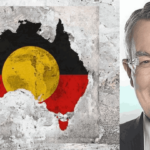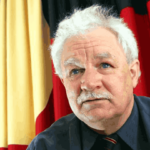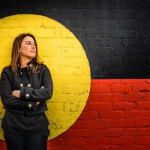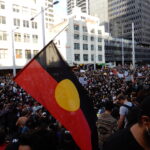“Vote No to Referendum”, Say Grassroots First Nations, “We Deserve More than a Voice”
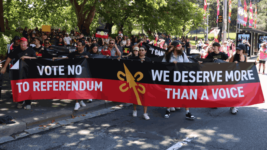
This 26 January marked 235 years since the British ships first docked at Kamay-Botany Bay with the intent of invading the continent today referred to as Australia, under the pretext of the doctrine of terra nullius, when clearly there were sovereign peoples occupying the land.
And down at Sydney’s Belmore Park on Thursday morning, the message coming from the First Nations Invasion Day rally was clear: vote no to the pending referendum on a Voice to Parliament, as First Nations people deserve more than a political advisory body with no veto power.
This year, the Albanese government is set to hold a referendum on enshrining an Indigenous voice to parliament in the Constitution: a body of First Nations representatives charged with giving suggestions to politicians in power on issues that affect their communities.
“Right now, the Albanese government, they’re trying to tell you that they’re our friend. They’re fucking not,” declared Lizzy Jarrett, the MC of the Invasion Day Sydney 2023 rally.
“So, when it comes that time when this illegal illegitimate regime of white supremacy asks you to vote, what are you going to do?” the Gumbaynggirr Dunghutti Bundjalung woman asked those gathered. And she added, “When it comes time, vote no for the referendum.”
Indeed, while the media has focused on spats between the major parties on the Voice, grassroots First Nations activists across the continent took the opportunity afforded by the momentum of the ongoing Invasion Day turnouts to cry foul on the referendum and proposed constitutional reform.
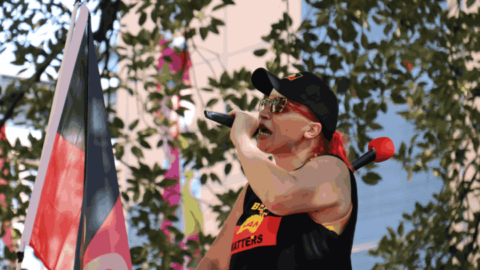
Rejecting recognition
“We don’t recognise the Australian Constitution. It has been founded on white supremacy. It has been founded on our denial. It has been founded on the removal and kidnapping of children,” said Lynda-June Coe. “They practiced genocide on Country, and they continue to do it.”
“The reckoning is that the First Nations Constitution is the oldest constitution on the planet,” the Wiradjuri and Badu Island Yinaa told the Invasion Day rally. “That is the recognition that needs to happen.”
In 2012, then PM Gillard ran with the idea of constitutional recognition: inserting mention of First Nations into the Australian Constitution. And at a 2017 meeting, the Referendum Council presented the Indigenous voice to parliament proposal as a more robust form of constitutional recognition.
But from the start, Coe and other First Nations representatives challenged this proposal as a tact for warding off the far more substantial process of treaty-making that should come after truth-telling in relation to the dispossession and genocide involved in the taking of this continent by the British.
Coe is a NSW Greens candidate for the upper house in the state election this March. And on Tuesday, she launched her Truth and Treaty Plan for NSW, which includes an allocation of seats for First Nations people in parliament.
“My people, this is the voice,” added Coe, in reference to the platform created by the protest. “They don’t want to hear it because we live in our truth. We speak truth to power every day.”
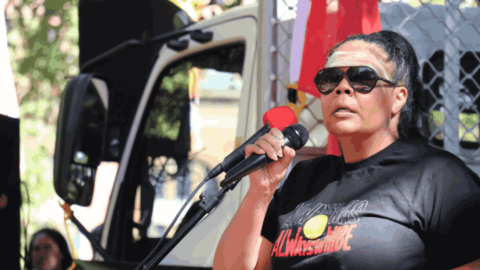
Falling on deaf ears
The last decade has seen an uptick in the momentum to abolish Australian Day, especially the marking of it on 26th January, as it signifies the beginning of the genocidal colonial project on this continent, which is increasingly being understood to be alive and well in the 2020s.
And nowhere has this been more apparent of late, than with the National Native Title Tribunal signing off on the Santos Narrabri gas project, which involves the fossil fuel company drilling 850 coal seam gas wells straight through Gomeroi Country, despite the Gomeroi Nation being against it.
“My bloodlines run all through Gomeroi. Anything that happens on that Country affects me to my core,” Gomeroi man Ian Brown said.
“A young sister here just spoke about the importance of life, the importance of water, the importance of us living on our Country. And we can’t, we won’t be able to do that, if we allow the fossil fuel industry to continue their assault on our traditional homeland.”
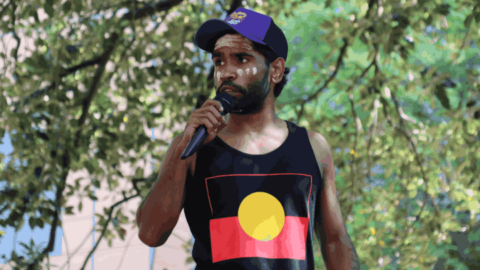
The representative of the Native Title applicants of the Gomeroi Nation pointed out that his people said an “overwhelming no to the Santos project”, which was still then given the green light, at the same time, as the federal government is spruiking the Voice as a means of empowerment.
“What about Gomeroi fucking voice? What about First Nations voices that are screaming and fighting to protect Country, to stop deaths in custody? It’s falling on deaf ears,” Brown made clear.
“I’m sorry, I have no trust in a Voice to Parliament. Why should we go to a referendum to put an advisory body into parliament, when they have no true veto powers. It’s going to be another flawed process of government not listening to mob.”
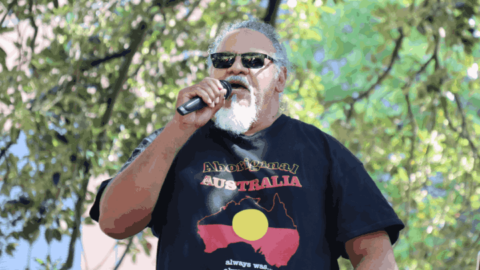
Forced assimilation
But Wangan and Jagalingou elder Adrian Burragubba painted a different story in regard to the two and a half century-old landgrab that continues on this continent.
After he and his people launched five court cases to take on Indian mining giant Adani, as well as the Australian and Queensland governments and native title law, the Indian mining giant was given approval to acquire their lands and begin works on the Carmichael coal mine.
Sydney Criminal Lawyers spoke to Adrian’s son rap artist Gurridyula, also known as Coedie McAvoy, last month, and he explained that under the provisions of the Human Rights Act 2019 (Qld), he was able to rightfully enter his people’s land and reoccupy it regardless of the rulings of the courts.
“We’ve just moved in and taken our land back…. They can’t touch us. That’s land rights. That’s what we want. We don’t want a Voice in the Constitution. We don’t want our voice in some racist white piece of legislation, that is a fictional thing,” Burragubba told the applauding Invasion Day crowd.
“Our lore is real. It’s alive. It is out there in the land. That is our lore,” he continued. “We are tired of this paternalistic attitude…. All this legislation of parliament and all these statutes and these Acts, we use those Acts against them to stop them usurping our sovereignty.”
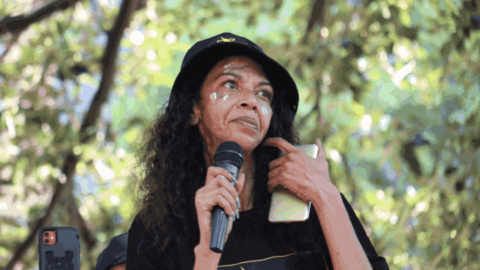
Land back
“We’ve changed the narrative. It’s in our court now. We ask that you not vote against us. You, the 97 percent of the population,” Gomeroi woman Gwenda Stanley said, as she addressed the massive crowd in the park.
An ambassador of the now 51-year-old Aboriginal Tent Embassy, Stanley recalled that in 2012, those gathered at the embassy in Canberra were given a mandate to go back out into their communities and recharge the campaign for First Nations rights.
The 2012 mandate has resulted in an escalation of the campaign to abolish Australia Day, and it has also seen a huge increase in the numbers of people attending Invasion Day protests, with thousands having gathered at Belmore Park this year.
“Since 2012, this is your result here today,” the Gomeroi woman continued. “We are the generation that Paul Coe warned you about 50 years ago…. We are here today to remind you that we are still here, and we are going nowhere. This has always been about land rights.”
Stanley advised that a new land back campaign is about to be launched by the Tent Embassy, Gamilaraay Next Generation and FISTT. And the focus will be on the return of land on First Nations terms, as, at present, the government is handing over resources tax-free to the fossil fuel industry.
“It is now time to address the war crimes in this country. It is time to stop the war. It is about land back. It is about restitution. It is about reparatory justice,” the ardent activist ended.


